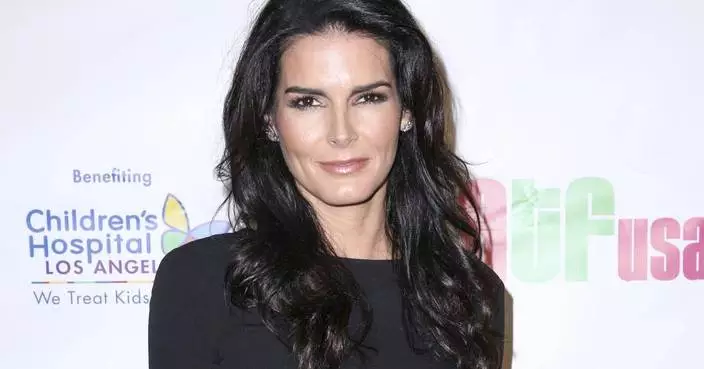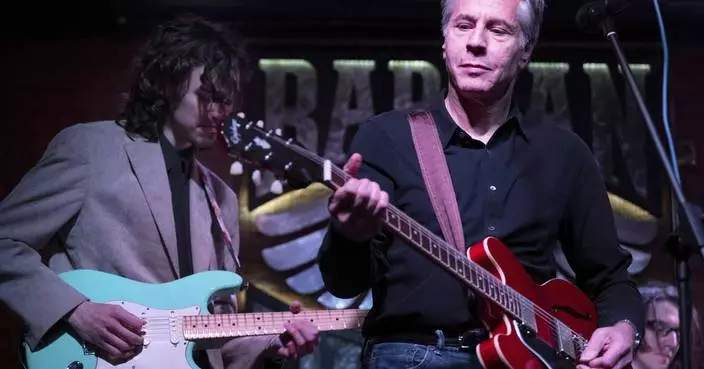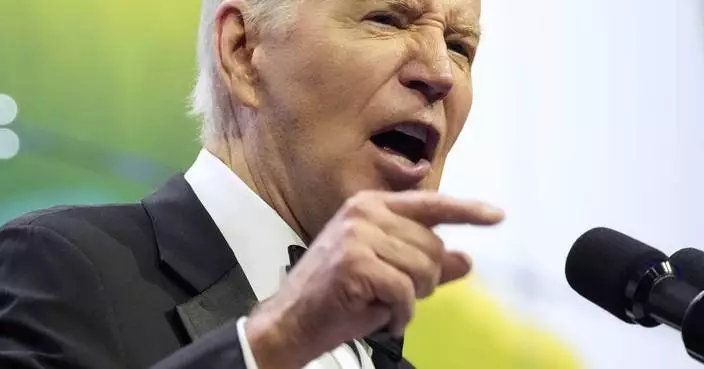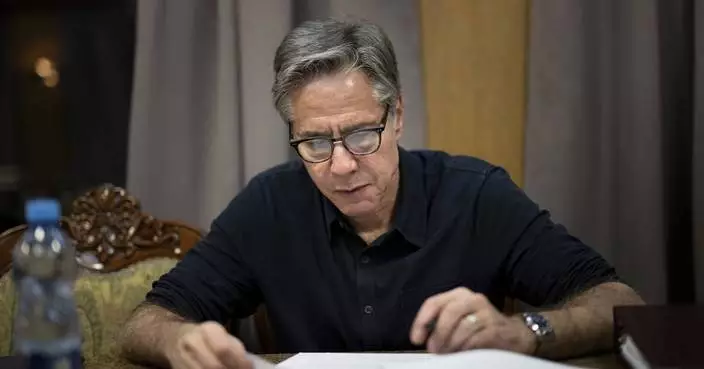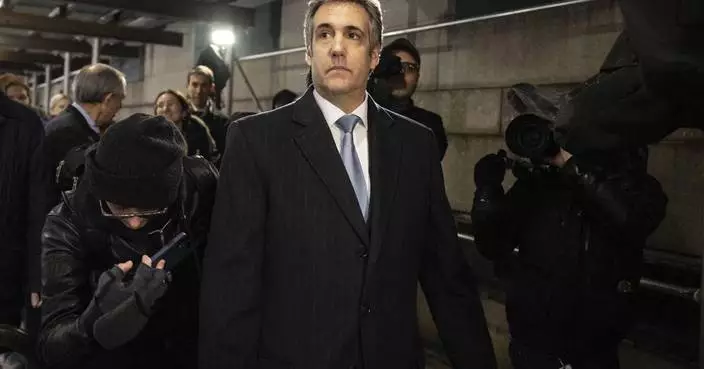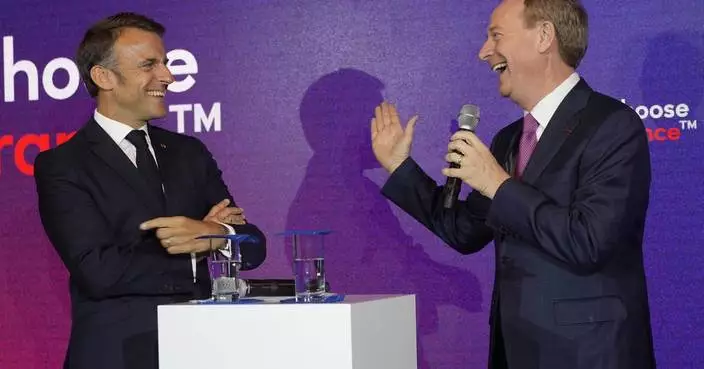Rather than tangle with a stronger U.S. military, Iran is poking and prodding its Western antagonists in ways apparently designed to avoid triggering war but that nonetheless seem to heighten the risk of missteps and miscalculation that could lead to an armed conflict with global consequences.
The tensions picked up Friday with Iran reporting it had seized a British-flagged oil tanker in the Persian Gulf , one day after the U.S. said it destroyed an Iranian drone that had flown within threatening range of an American warship in the Strait of Hormuz. In June the Iranians shot down a U.S. Navy drone in the same area, prompting President Donald Trump to authorize a military strike on Iran, only to call it off at the last moment .
Trump's response to the latest escalation in the Gulf captured both the urgency and the unending difficulty of dealing with the Islamic Republic.
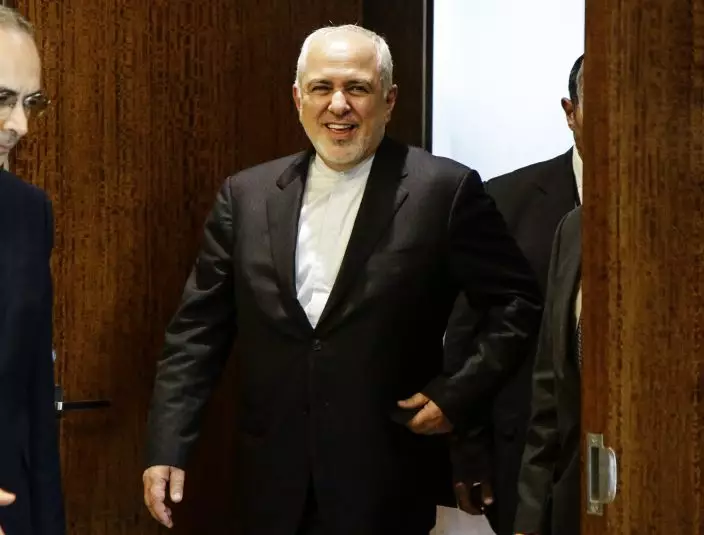
Iranian Foreign Minister Mohammad Javad Zarif arrives for a meeting with U.N. Secretary General Antonio Guterres at United Nations headquarters Thursday, July 18, 2019. (AP PhotoFrank Franklin II)
"Trouble, nothing but trouble," Trump told reporters when asked about Iran's Revolutionary Guard saying it had seized a British tanker.
From Iran's point of view, the real trouble is Trump, who withdrew the United States last year from a 2015 nuclear deal that offered new hope for Iran's faltering economy.
The British government said two vessels had been seized by the Iranians, but Iran later said the second ship had departed Iranian waters. The Iranians said the seizure was in response to Britain's role in impounding an Iranian supertanker two weeks earlier.
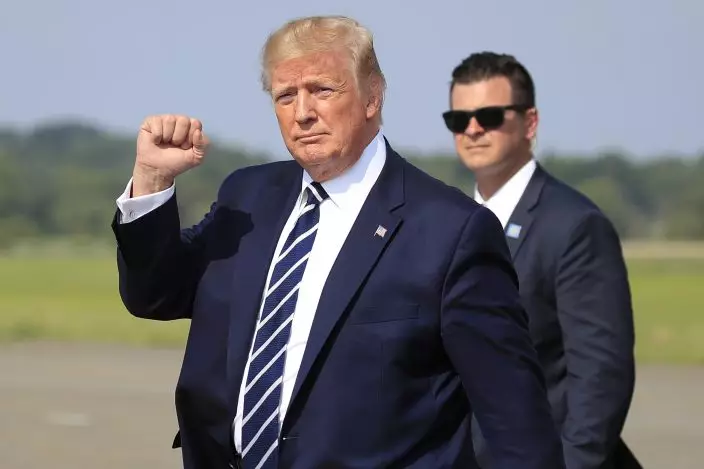
President Donald Trump waves as he walks from Air Force One upon arrival at Morristown Municipal Airport, in Morristown, N.J., Friday, July 19, 2019. (AP PhotoManuel Balce Ceneta)
The incidents highlighted the precarious state of maritime security in the Gulf and reinforced the Trump administration's argument for launching a new effort to intensify the monitoring of commercial shipping in and around the Gulf, which handles a large volume of international oil traffic . The administration is organizing what it calls Operation Sentinel with like-minded nations to deter Iran from interfering with commercial shipping.
In the meantime, U.S. Central Command said Friday it put additional patrol aircraft into international airspace in the Strait of Hormuz to monitor the situation. A spokesman, Lt. Col. Earl Brown, said U.S. Naval Forces Central Command was in contact with U.S. ships operating in the area to "ensure their safety."
The U.S. also is sending American forces, including fighter aircraft, air defense missiles and likely more than 500 troops, to a Saudi air base that became a hub of American air power in the Middle East in the 1990s. Putting U.S. combat forces back in the kingdom after an absence of more than a decade adds depth to the regional alignment of U.S. military power, which is mostly in locations on the Persian Gulf that are more vulnerable to Iranian missile attack.
The high-stakes sparring between Iran and the West is playing out while diplomats maneuver for the real prize: new negotiations to put tighter and longer-lasting wraps on Iran's nuclear program in exchange for relief from economic sanctions that are strangling Iran's already weak economy.
Trump believes the international agreement he withdrew from is too short-term and too narrow because it does not address Iran's ballistic missile program and its support for extremist militias across the Middle East. His administration has imposed additional sanctions on Iran, including ending a waiver on penalties against nations that buy Iranian oil.
Iran's foreign minister, Mohammad Javad Zarif, hinted this past week at Tehran's interest in a diplomatic solution. He said Iran would be willing to move up parliamentary ratification of an agreement it made with the International Atomic Energy Agency that outlined the agency's access to Iranian nuclear sites and other information. He said this could be done before the scheduled 2023 ratification if the United States eased sanctions.
The Trump administration showed no immediate interest in that offer, but senior officials, including Trump, periodically emphasize their hope that war is avoided and that both sides can take the preferred diplomatic path.
"We need them to come to the table," Secretary of State Mike Pompeo said at the State Department on Friday. "It's the right way to resolve these challenges."
Critics question whether the administration has a viable approach to Iran that can be executed without pushing the U.S. toward war.
"My fundamental question to this administration is: What is the strategy? I know that it is about maximum pressure, but to what end?" said Wendy Sherman, the former undersecretary of state for political affairs who helped the Obama administration negotiate the 2015 nuclear deal.
She said Friday at the Aspen Security Forum in Colorado that she believes the Iranians are weighing the likelihood that they will have to deal with Trump beyond 2020.
"If they think he will be re-elected or think there's a good chance that he will be, I think we will continue to see proposals from the Iranians," she said.
The administration faces pressure from members of its own party in Congress to take more aggressive action to punish Iran.
"The ayatollahs will continue their campaign of terror as long as we let them," said Sen. Tom Cotton, R-Ark. "Outrageous and lawless acts such as this hijacking call for international condemnation and punishment."
Trump suggested U.S. pressure is hitting Iran's economy so hard that Iran will be forced at some point to come to the negotiating table.
"Iran is in big trouble right now," he said. "Their economy is crashing. It's coming to a crash. They're trying to bring soldiers back home because they can't pay them. A lot of bad things are happening to them. And it's very easy to straighten out or it's very easy for us to make it a lot worse."
Associated Press reporter Deb Riechmann contributed to this report.
CANNES, France (AP) — The Cannes Film Festival is hallowed ground in cinema but understanding its unique landscape can be confounding.
The Côte d’Azur festival, which kicked off Tuesday, is a 10-day ballet of spectacle and film where even the photographers wear tuxedos, standing ovations are timed with stopwatches and movies tend to be referred to by the names of their directors — “the Almodóvar,” “the Malick,” “the Coppola.”
From the outside, it can seem mad. From the inside, it can be hardly less disorienting. But grasping some of Cannes' quirks and traditions can help you understand just what is unspooling in the south of France and what, exactly, a Palm Dog is.
The short answer is that Cannes is the largest and arguably most significant film festival, and few care more deeply about the art of cinema than the French. This is where cinema was born and it’s where it’s most closely guarded. It’s not a coincidence that to enter the Palais des Festivals, the central hub, you must climb 24 red-carpeted steps, as if you’re ascending into some movie nirvana.
Cannes is also singularly global, attracting filmmakers, producers and journalists from around the world. It’s a little like an Olympics for film; countries set up their own tents in an international village. Because Cannes is also the largest film market in the world, many who come here are trying to sell their movies or looking to buy up rights. Deal-making, though not quite the frenzy it once was, happens in hotel rooms along the Croisette, aboard yachts docked in the harbor and, yes, on Zoom calls.
But aside from being a beacon to filmmakers and executives, Cannes is a draw for its shimmering French Riviera glamour. Since the days of stars like Grace Kelly and Brigitte Bardot, Cannes has been renown as a sun-kissed center stage for fashion.
Originally called the International Film Festival, Cannes was born in the lead-up to World War II. Venice had launched the first major film festival in 1932, but in 1938, fascist influence on Venice was pervasive. The French government in 1939 chose the tourist destination of Cannes as the place for a new festival — though because of the war, the first edition wasn’t held until 1946. This year’s festival is the 77th edition.
Many people say the name of the French city and its eponymous festival wrong. Here’s what you should picture in your head: A can of soup. The pronunciation is closer to “can” than it is “con.” And definitely not several cans of soup – the “s” is silent.
The hive of activity is the Palais, a massive complex by the sea full of cinemas with names like Buñuel, Bazin and, the granddaddy, the Grand Théâtre Lumière. This is where the red carpet runs in Cannes, nightly hosting two or three world premieres beneath a glass canopy flanked by rows of photographers. Festival cars ferry stars and directors who are ushered down the carpet and up the steps. Unlike most movie premieres, there are no reporters on the carpet.
Filmmakers and casts instead face questions from the media the day after their premieres, at a press conference preceded by a photo call. The press conferences can be atypically newsy, too; after Danish director Lars von Trier declared “I am a Nazi” at a Cannes press conference in 2011, he was named “persona non grata” by the festival for years.
Interpreters translate live for headphone-wearing reporters. Inside the Palais, bleary-eyed attendees are treated to gratis espresso.
Down the Croisette, the oceanside, palm tree-lined promenade of Cannes, there are regal old hotels like the Carlton and the Martinez from where festival attendees flow in and out, interviews might be happening on balconies as autograph-seeking fans gather outside in throngs. After-parties are typically held in clubs across the Croisette, by the beach.
Unlike public festivals like Toronto or SXSW, Cannes is industry-only and largely out of reach for most moviegoers. That doesn’t stop the desperate, tuxedo-clad ticket seekers who hold signs outside the Palais on the chance someone has an extra, or the photo-takers who stand on small ladders near the red carpet.
Cannes is rigorously hierarchical, with a system of color-coded badges regulating access. If you hear about a film being booed at Cannes — even Martin Scorsese’s “Taxi Driver” was famously jeered before winning the Palme d’Or — it's usually at a press screening.
The premieres, largely attended by industry professionals, are where the prolonged standing ovations take place. But this, like many things at Cannes, is a bit of stagecraft to boost the mythology. After the credits role, a cameraman rushes in, with his footage fed live to the screen. He goes down the aisles, giving the audience a chance to applaud for the director and each star. No one is just cheering for a dark movie screen.
Cannes hierarchy is in the lineup, too. Attention focuses most on the films “in competition”: usually around 20 movies competing for the Palme d’Or, the festival’s top award. Past winners include “Apocalypse Now,” “Pulp Fiction,” and “Parasite.” Last year, it went to Justine Triet’s “Anatomy of a Fall.” Winners are chosen by a jury of nine that changes every year. This year’s is presided over by Greta Gerwig.
Competition is only one section, though. Many high-profile films might play out of competition, as “Furiosa: A Mad Max Saga” is this year. Un Certain Regard gathers a lineup of original or daring films. First and second films play in the sidebar Critics’ Week. There are also midnight selections and the recently launched Premiere sidebar, which also takes some overflow for films that didn’t fit into competition. Restorations and documentaries play in Cannes Classics.
And down the Croisette, separate from the official selection, is the Directors' Fortnight or the Quinzaine, a parallel showcase launched in 1969 by a group of French filmmakers after the 1968 Cannes was canceled.
There are many other prizes, too, even an unofficial one created by journalists called the Palm Dog (sadly, not the Palme D'Og), for the best canine in Cannes. Last year, that honor went to Messi, the “Anatomy of a Fall” pooch.
Created in 2001, the annual award and its spinoff categories is decided by a jury of reporters. Past winners have included Uggie from “The Artist” (2011) and Sayuri, who played the heroic pit bull in “Once Upon A Time ... In Hollywood” (2019).
As for the reigning champ, Messi captivated the carpet on opening day this year, in town again as a correspawndent of sorts for French television.

People play chess on the Boulevard de la Croisette ahead of the 77th international film festival in Cannes, southern France, Monday, May 13, 2024. The Cannes film festival runs from May 14 until May 25, 2024. (AP Photo/Daniel Cole)

Jury members Lily Gladstone, left, and Omar Sy pose for photographers during the jury photo call at the 77th international film festival, Cannes, southern France, Tuesday, May 14, 2024. (Photo by Scott Garfitt/Invision/AP)

Messi the dog poses for photographers upon arrival at the awards ceremony and the premiere of the film 'The Second Act' during the 77th international film festival, Cannes, southern France, Tuesday, May 14, 2024. (Photo by Daniel Cole/Invision/AP)

Messi the dog poses for photographers upon arrival at the awards ceremony and the premiere of the film 'The Second Act' during the 77th international film festival, Cannes, southern France, Tuesday, May 14, 2024. (Photo by Daniel Cole/Invision/AP)

Jury president Greta Gerwig, second form left, poses with jury members Omar Sy, from left, Lily Gladstone, Nadine Labaki, Ebru Ceylan, Kore-eda Hirokazu, J.A. Bayona, Eva Green, and Pierfrancesco Favino upon arrival at the awards ceremony and the premiere of the film 'The Second Act' during the 77th international film festival, Cannes, southern France, Tuesday, May 14, 2024. (Photo by Vianney Le Caer/Invision/AP)

Jury president Greta Gerwig enters the opening ceremony of the 77th international film festival, Cannes, southern France, Tuesday, May 14, 2024. (Photo by Vianney Le Caer/Invision/AP)

A person walks past the Cannes film festival logo during preparations for the 77th international film festival, Cannes, southern France, Monday, May 13, 2024. The Cannes film festival runs from May 14 until May 25, 2024. (AP Photo/Andreea Alexandru)

The Palme d'Or is displayed at the 77th international film festival, Cannes, southern France, Tuesday, May 14, 2024. The Cannes film festival runs from May 14 until May 25, 2024. (Photo by Vianney Le Caer/Invision/AP)

The Cannes sign is pictured above the old town ahead of the the 77th international film festival, Cannes, southern France, Monday, May 13, 2024. The Cannes film festival runs from May 14 until May 25, 2024. (AP Photo/Andreea Alexandru)

FILE - The Promenade de la Croisette appears prior to the 74th international film festival, Cannes, in southern France, on July 5, 2021. The 77th annual Cannes Film Festival begins on May 14. (Photo by Vianney Le Caer/Invision/AP, File)

Festival workers lay the red carpet at the Palais des Festivals on opening day of the 77th international film festival, Cannes, southern France, Tuesday, May 14, 2024. The Cannes film festival runs from May 14 until May 25, 2024. (Photo by Andreea Alexandru/Invision/AP)
















